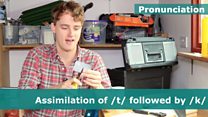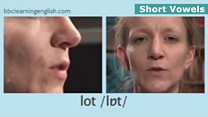Unit 27: Towards Advanced
Grammar, news, vocabulary and pronunciation
Select a unit
- 1 Towards advanced
- 2 Towards advanced
- 3 Towards advanced
- 4 Towards advanced
- 5 Towards advanced
- 6 Towards advanced
- 7 Towards advanced
- 8 Towards advanced
- 9 Towards Advanced
- 10 Towards Advanced
- 11 Towards Advanced
- 12 Towards Advanced
- 13 Towards Advanced
- 14 Towards Advanced
- 15 Towards Advanced
- 16 Towards Advanced
- 17 Towards Advanced
- 18 Towards Advanced
- 19 Towards Advanced
- 20 Towards Advanced
- 21 Towards Advanced
- 22 Towards Advanced
- 23 Towards Advanced
- 24 Towards Advanced
- 25 Towards Advanced
- 26 Towards Advanced
- 27 Towards Advanced
- 28 Towards Advanced
- 29 Towards Advanced
- 30 Towards Advanced
Session 5
Tim's Pronunciation Workshop: /h/
How do we pronounce words beginning with /h/ in natural spoken English?
Activity 1
Tim's Pronunciation Workshop: Elision of /h/
He looks like he's had an accident – again!
Tim's back in his pronunciation workshop and he's not having much luck with his DIY. Find out what the problem is – and hear how some Londoners don't pronounce all their 'h' sounds.
To do
Take a look at the video, then try the activity to do some practice.
Watch the video and complete the activity

Tim
Hi. I'm Tim and this is my Pronunciation workshop. Here I'm going to show you how English is really spoken. Come on, let's go inside. Now, if you’ve been following my adventures in this workshop, you will know that I have had a bit of bad luck, now and then. But not half as much bad luck as this chap. Listen to what these people are saying about him.
Voxpops
He looks like he’s had an accident.
He looks like he’s had an accident.
He looks like he’s had an accident.
He looks like he’s had an accident.
Tim
Now, they all used the word ‘he’ twice. But there were two different pronunciations. Listen out for them both as you watch again.
Voxpops
He looks like he’s had an accident.
He looks like he’s had an accident.
He looks like he’s had an accident.
He looks like he’s had an accident.
Tim
In fluent speech, if the word ‘he’ comes at the beginning of a sentence or clause, then the ‘h’ sound /h/ is pronounced. But if it comes in the middle of a sentence or clause and after a consonant, then the ‘h’ sound is not usually pronounced. So /hiː/ becomes /iː/ and ‘he looks like he’s had an accident’ becomes ‘he looks like ‘e’s had an accident’. Not this change also happens with certain other words beginning with the ‘h’ sound, like him, his or her. Here are some more examples.
Examples
I really like his cooking.
We think he’s left the country.
They let him leave early.
They offered her a promotion.
Tim
Right, so you’ve heard the examples, and now it’s your turn. You know the drill by now. Listen and repeat.
Examples
I really like his cooking.
We think he’s left the country.
They let him leave early.
They offered her a promotion.
Tim
Well done. Now remember, if you want to learn more about pronunciation, then please visit our website, bbclearningenglish.com. And that is about it from the pronunciation workshop for this week. I'll see you soon. Bye bye! Now, that man in the photograph – his head looked a bit sore – which reminds me. Saw! I love DIY! Actually, I am a bit accident-prone. But my twin Tom is very good with his hands. I think I’ll give him a ring and ask for his advice. Ow! Every time!
To do
So that's a look at the pronunciation of the 'h' sound /h/ in natural spoken English. Now try this activity to get some more practice.
The elision of /h/ game
4 Questions
How many examples of elision of /h/ are there in each sentence? You decide...
Help
Activity
How many examples of elision of /h/ are there in each sentence? You decide...
Hint
We usually don’t pronounce /h/ when it appears at the beginning of a word which comes after a consonant in the middle of a sentence or clause, so (for example) /hiːz/ becomes /iːz/.Question 1 of 4

Help
Activity
How many examples of elision of /h/ are there in each sentence? You decide...
Hint
We usually don’t pronounce /h/ when it appears at the beginning of a word which comes after a consonant in the middle of a sentence or clause, so (for example) /hiːz/ becomes /iːz/.Question 2 of 4

Help
Activity
How many examples of elision of /h/ are there in each sentence? You decide...
Hint
We often don’t pronounce /h/ when it appears at the beginning of a word which comes after a consonant in the middle of a sentence or clause, so (for example) /hiːz/ becomes /iːz/.Question 3 of 4

Help
Activity
How many examples of elision of /h/ are there in each sentence? You decide...
Hint
We usually don’t pronounce /h/ when it appears at the beginning of a word which comes after a consonant in the middle of a sentence or clause, so (for example) /hiːz/ becomes /iːz/.Question 4 of 4

Excellent! Great job! Bad luck! You scored:
End of Unit 27
We hope that was useful. In Unit 28, Dan has a Masterclass on question tags, doesn't he? In News Review and LingoHack you can find out which words are making the headlines - and Tim will be back with the pronunciation workshop as usual. See you there!
Session Vocabulary
Elision of /h/
When we're speaking English fluently, sometimes we don't pronounce all the letters in words. This happens with the letter h and its sound /h/ in words like he, her, him and his. When the letter h comes in the middle of a sentence or clause and after a consonant sound, we don't pronounce the /h/ sound.
- I baked her a cake for her birthday.
- His teacher told him to do the homework, or he'd get detention.
- Harry's just phoned to say he'll be late. He's missed his train again.
- I thought Pete would be here. He said he was coming to the party.


